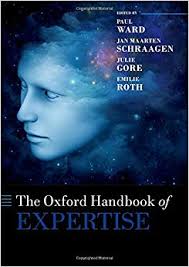
Edited by Paul Ward, Jan Maarten Schraagen, Julie Gore, and Emilie Roth
Reviewed by Jan Maarten Schraagen
The Oxford Handbook of Expertise provides a comprehensive picture of the field of Expertise Studies. It offers both traditional and contemporary perspectives, and importantly, a multidiscipline-multimethod view of the science and engineering research on expertise. The book presents different perspectives, theories, and methods of conducting expertise research. As such, it is organized into five Sections:
- Section One deals with frameworks, theories and models for characterising expertise. Its chapters range from neural mechanisms of expertise, via the classic expertise approach (dominated by the seminal work of Herbert Simon and Bill Chase from Carnegie-Mellon University), to contemporary macro-cognitive models of expertise, as well as situated and distributed approaches to expertise, all the way up to sociological perspectives on expertise.
- Section Two is on methods to study, test, analyze and represent expertise, and covers both familiar ground (Hierarchical Task Analysis, Incident-based methods, Cognitive Work Analysis), as well as qualitative research methods such as ethnography and video reflexivity.
- Section Three delves into the various domains of expertise that have been studied, such as music, sports, healthcare, firefighting, aviation, military, railroad, nuclear, and spaceflight. Interestingly, compared to other Handbooks, this section also covers domains that have only recently been studied, as they have emerged over the past decade or so: the cyber domains and intelligence analysis. Moreover, it also covers ill-structured domains such as law enforcement and business.
- Section Four is on developing, accelerating, and preserving expertise, and is likely the most forward-looking part of the Handbook. It discusses such concepts and theories as ‘team reflection’, ‘cognitive flexibility theory’, the role of mentors and coaches in developing expertise, how to acquire the expertise that will be needed to prosper in the twenty-first century, and how to frame and translate expertise for government. For you as a reader interested in resilience engineering, it also contains a chapter on ‘expertise and resilience’ by Havinga, Bergstrom, Dekker, and Rae.
- Finally, Section Five contains a very readable and timely chapter on the “war” on expertise as waged by five communities that seek to discredit experts and how to respond to these communities. If there is one chapter that everyone in our community should read, it is this one.
Each chapter in this Handbook was thoroughly reviewed by at least two reviewers (as a Section editor, I can attest to this). As a result, at almost 1300 pages this is a true goldmine that both provides state of the art reviews as well as foundations for future research. It also shows how the various views on expertise can be used to address current issues. Compared to other Handbooks, this one is more comprehensive in its scope and more inclusive in its approach. But don’t take my word for it: as an Editor of this Handbook, I invite you to make up your own mind!
